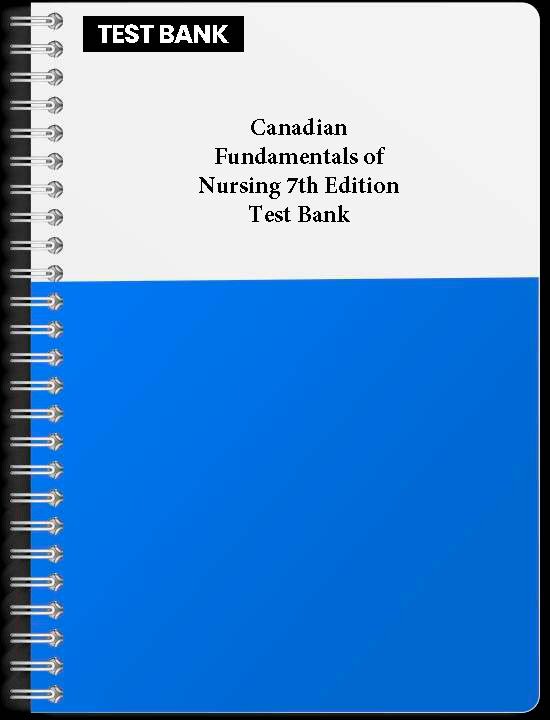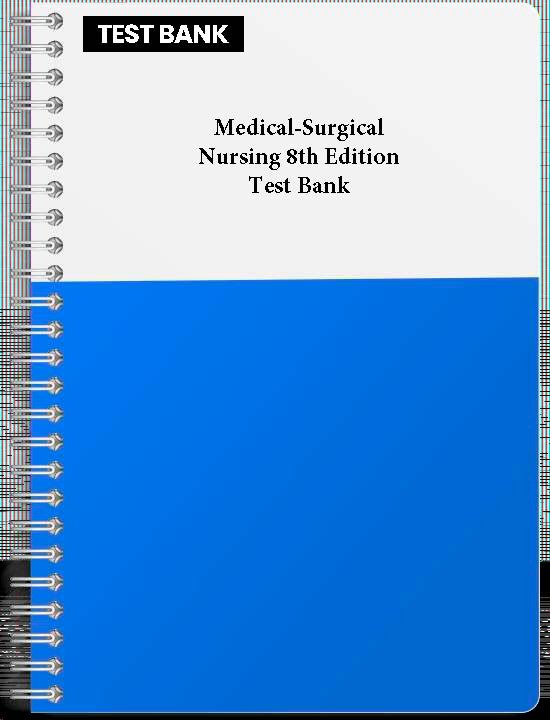Description
Fundamentals of Nursing 12th Edition Test Bank is a vital resource designed to support nursing students in mastering foundational concepts, clinical skills, and critical thinking necessary for safe and effective nursing practice. Aligned with the Fundamentals of Nursing textbook, this test bank includes a variety of questions that assess knowledge, application, and understanding of key nursing principles. Here’s an overview of the main areas covered:
- Foundations of Nursing Practice: Questions cover core concepts such as the nursing process, critical thinking, clinical decision-making, and evidence-based practice. This section provides an understanding of nursing’s role and scope within the healthcare system.
- Patient Safety and Infection Control: Focuses on safety protocols, infection prevention, aseptic techniques, and patient positioning to prevent falls and injuries. This section emphasizes standard precautions, hand hygiene, and infection control measures.
- Communication in Nursing: Includes questions on therapeutic communication, patient-centered care, and cultural sensitivity. Topics also cover effective communication with patients, families, and interprofessional teams.
- Health Assessment and Physical Examination: Questions assess knowledge of comprehensive health assessments, including history-taking, vital signs, and physical examination techniques across various body systems. Emphasis is placed on recognizing normal and abnormal findings.
- Vital Signs and Basic Monitoring: Covers measurement and interpretation of vital signs, including temperature, pulse, respiration, blood pressure, and oxygen saturation. Questions also address understanding changes in vital signs and when to escalate care.
- Hygiene and Basic Care: Includes questions on providing personal hygiene, oral care, skin integrity, and wound care. This section emphasizes maintaining patient comfort, promoting dignity, and preventing complications like pressure ulcers.
- Mobility and Immobility: Focuses on the impact of mobility on health, prevention of complications related to immobility, and safe patient handling techniques. Topics also include range-of-motion exercises and assistive devices.
- Nutrition and Hydration: Covers nutrition assessment, feeding techniques, fluid balance, and managing feeding tubes. Questions emphasize recognizing malnutrition, dehydration, and providing dietary education.
- Medication Administration: Includes principles of safe medication administration, including dosage calculations, routes of administration, and prevention of medication errors. Topics also cover patient education on medications and adherence to the “five rights” of medication administration.
- Elimination and Bowel/Bladder Care: Questions cover urinary and bowel assessment, catheterization, managing incontinence, and maintaining dignity in personal care. This section also includes care for patients with colostomies or urostomies.
- Oxygenation and Respiratory Care: Focuses on respiratory assessment, oxygen therapy, airway management, and interventions to promote effective breathing. Topics include using incentive spirometry, monitoring oxygen levels, and administering respiratory medications.
- Pain Management: Covers pain assessment, pharmacologic and non-pharmacologic interventions, and individualized care for pain relief. Questions emphasize patient self-reporting, pain scales, and documentation.
- End-of-Life and Palliative Care: Includes topics on providing compassionate end-of-life care, managing symptoms, supporting families, and understanding the nurse’s role in hospice and palliative care settings.
- Legal and Ethical Considerations: Questions address informed consent, patient rights, documentation standards, confidentiality, and ethical decision-making in nursing practice.
- Patient Education and Health Promotion: Emphasizes teaching strategies, health literacy, and techniques for educating patients about self-care, disease prevention, and healthy lifestyle choices.
1 Nursing Today 1
2 Health Care Delivery System
3 Community-Based Nursing Practice
4 Theoretical Foundations of Nursing Practice
5 Nursing Research as a Basis for Practice
6 Health and Wellness
7 Caring in Nursing Practice
8 Culture and Ethnicity
9 Caring for Families
10 Developmental Theories
11 Conception Through Adolescence
12 Young to Middle Adult
13 Older Adult
14 Critical Thinking in Nursing Practice
15 Nursing Assessment
16 Nursing Diagnosis
17 Planning Nursing Care
18 Implementing Nursing Care
19 Evaluation
20 Managing Client Care
21 Ethics and Values
22 Legal Implications in Nursing Practice
23 Communication
24 Client Education
25 Documentation
26 Self-Concept
27 Sexuality
28 Spiritual Health
29 The Experience of Loss, Death, and Grief
30 Stress and Coping
31 Vital Signs
32 Heath Assessment and Physical Examination
33 Infection Control
34 Medication Administration
35 Complementary and Alternative Therapies
36 Activity and Exercise
37 Client Safety
38 Hygiene
39 Oxygenation
40 Fluid, Electrolyte, and Acid-Base Balances
41 Sleep
42 Comfort
43 Nutrition
44 Urinary Elimination
45 Bowel Elimination
46 Mobility and Immobility
47 Skin Integrity and Wound Care
48 Sensory Alteration
49 Care of Surgical Clients







Reviews
There are no reviews yet.